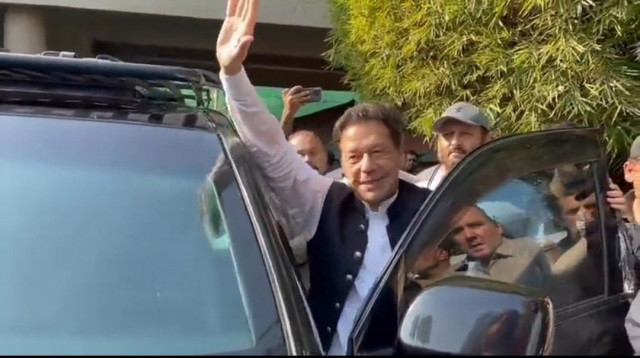Power struggle: Another ex-PM joins ‘illustrious’ arrest list
Experts say political and other forces haven’t learnt from the past

Power politics based on unprincipled and brutal struggle among politicians as well as some members of the state institutions finally led on Tuesday to add another former prime minister’s name to the so-called “illustrious list” of those arrested.
The arrest of former prime minister and Pakistan Tehreek-e-Insaf (PTI) Chairman Imran Khan not only triggered protests in different cities but also led to unprecedented attacks on some sensitive installations.
Some experts had no doubt that the political as well as other forces haven’t learnt anything from the past as the desire to keep running the country without having a “non-partisan state structure” was evident in such arrests.
“It’s all about power politics,” said eminent scholar Prof Dr Hassan Askari. “The only difference this time around is that the state institutions have come into it,” he added.
Currently, the professor continued, one side is going against some judges of the Supreme Court, while the other side is going against some officials of the military. However, he said, all these things had nothing to do with the real issues of the country and its people.
At the moment, Prof Askari said, “an unprincipled and brutal struggle” was going on in Pakistan. “It has two dimensions: power struggle among the political elite and political parties versus the state institutions,” he added.
Askari opined that Imran’s arrest might satisfy some leaders or some people in the institutions but it sent a negative message to the world. Pakistan, he continued, was faltering in respect of effective functioning of the state while the economy was being undermined the most.
Commenting on Imran’s joining the “illustrious list” of the arrested politicians, including Nawaz Sharif, Asif Zardari, Shahid Khaqan Abbasi and Maryam Nawaz and others, Askari said that “we haven’t learnt any lessons from the past.
“We do not want a non-partisan state structure; we want action against the rivals,” Askari said, citing the example of the PTI going after the PML-N during its tenure, and the PML-N going after PTI even when it was at the “fag end” of its rule.
“This bad trend of arresting top political leaders continues,” Askari said. He noted that the ruling alliance felt that Imran’s arrest would weaken the PTI. “It might happen but simultaneously, chances are that it will increase PTI’s popularity.”
In both the PTI and the PML-N tenures, he said, those in power continued to justify action against their rivals.
Abdul Moiz Jaferii, a lawyer and political analyst, said that the National Accountability Bureau (NAB) had remained a tool of the establishment for several years and it was being used against Imran, the same way Imran had used it against his rivals when he was in the government. “NAB has no credibility. We all know, who is behind Imran’s arrest.”
Jaferii, who also writes for different publications, said that the trend of arresting key political leaders would continue unless the “usurpers” are properly dealt with, adding that arresting Imran forspeaking against some army officials was incorrect.
Listing different reasons for someone’s arrest, Jaferii said that a person was arrested if he had been danger to the society; if he could influence his/her case or witnesses; if he/she was a flight risk; and if he was not cooperating at the investigation stage.
“He [Imran] can be called a misogynist, but he is not going to flee abroad,” Jaferii said, adding that his name could be placed on the Exit Control List (ECL) if one felt that he was a flight risk.
In fact, Jaferii continued, the concept of arresting under the NAB law was questionable but this is what Imran used to do, and the same was happening to him now. “Arresting someone just to harass him is wrong,” he said.
Commenting on the attacks on sensitive installations, Jaferii said that people were responding in an unprecedented way because they felt that the unelected people were usurping their rights.
When asked where this situation could lead, Jaferii said that martial law would long have been imposed in the country had the country’s economy could bear the brunt of it or had any foreign powers were happy to see it happening. “Who would want to impose martial law just for announcing bankruptcy in a few months’ time,” he said.
Prof Askari, however, did not rule out the possibility of martial law, especially, after attacks on key buildings. He said that blame would be on all political parties as everyone was contributing to the ongoing chaos.



















COMMENTS
Comments are moderated and generally will be posted if they are on-topic and not abusive.
For more information, please see our Comments FAQ